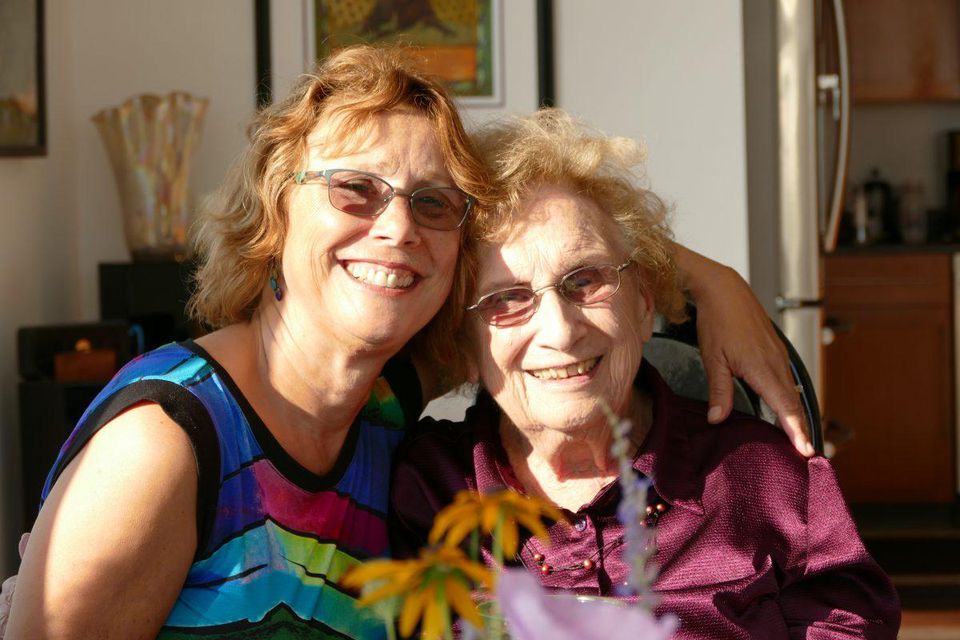“I’m sorry for keeping my phone on,” I said as I introduced myself at a recent conference. I was excited to be speaking to thought leaders, industry experts and policymakers in Washington about supporting employees who are taking care of their loved ones, but I was also distracted.
My 90-year old mother had recently suffered a compression fracture in her back. Within a week, she’d gone from vacationing in Cancun to being immobilized in agonizing pain. Sure enough, as I was speaking, my cell phone rang. “Sorry everyone,” I said, pausing my presentation, “that’s my mom.” Cue the Alanis Morissette song, right? We were discussing the difficulties faced by family caregivers, and I was experiencing them in real time before everyone’s eyes. I ran out of the room and picked up the call, only to get unsettling news. My mother explained she was being discharged from rehab within days. “What?” I exclaimed. “But you can’t get out of bed on your own!”
“I know,” my mother replied. “You’ll need to come on Thursday, because I can’t be alone when I go home.”
For over 30 years, I’ve worked in the field of senior care, much of it supporting family caregivers — the unsung heroes of our nation’s system of long-term care. Numbering about 40 million, unpaid family caregivers provide 80% of all long-term care in the U.S. I frequently write and lecture about the challenges these caregivers face, especially in the workplace. I lead a team of social workers who provide personalized guidance and support to employees facing family care challenges. I wrote a book about the burdens and benefits of caregiving called My Parent’s Keeper: The Guilt, Grief, Guesswork and Unexpected Gifts of Caregiving. I’ve also experienced caregiving firsthand with my own father, who suffered from dementia for 12 years. So I should have been prepared for what happened after I got that call from my mom — but I wasn’t. It was a stark reminder of the chaos, stress, uncertainty and overall disruption that can upend your life when you are unexpectedly faced with a caregiving crisis.
By the time I arrived at the rehab to take my mother home, I felt apprehensive. For the next several days, I was going to manage my mom’s care. I reassured myself that everything would be explained to me by the nursing and discharge staff. Thanks to the CARE Act (Caregiver Advise Record Enable), in–patient facilities in 36 states are required to carefully explain and demonstrate discharge instructions to a patient’s designated family caregiver, who in this case was me. I felt my heart beat rapidly and my stomach churn as the nurse reviewed the list of complicated instructions. My mother had gone from taking no daily pills to well over a dozen medications, which had to be administered at specific intervals. Then there would be wound care, and transfers from bed to chair, and ankle swelling that had to be monitored. Given my mother’s limited mobility, she needed medical equipment, including a hospital bed, lift chair, commode and shower chair, none of which were covered by Medicare.
The next several days were a blur of non-stop tasks, many of which I felt incompetent doing. The Home Alone Study, conducted by AARP and the United Hospital Fund, found that close to half of all family caregivers perform in-home medical and nursing tasks for their loved ones with multiple chronic and cognitive conditions. These caregivers—most often daughters—are managing medication, operating medical equipment, and tending to wounds. They’re also bathing, toileting and dressing their family members. Many find the dual role of devoted daughter/Florence Nightingale physically and emotionally taxing.
For me, the worst part was how helpless I felt to relieve my mother’s pain. When I tried to shift her position, she howled. Getting her in and out of bed was an ordeal that took over an hour. During the night, I vigilantly listened for my mother’s faint voice calling for assistance. After three days, I was a mess. When my brother arrived to relieve me, he was shocked by my appearance. “You look like shit,” he said, with sympathetic irreverence. It was the first time I’d laughed in days.
Tough as this was, I’m among the lucky ones. I have a brother and sister who live nearby and share the caregiving. Unlike many siblings who engage in spats and all out warfare, we do our best to divvy up the workload. My mother has long term care insurance and can pay out-of-pocket for care if needed, a luxury many people can’t afford. And I have extensive knowledge of our byzantine long-term care system, which helped me navigate my mother’s situation. But none of that spared me the stress of caring for my mom while trying not to drop the ball at work.
Years ago, when I was helping care for my father, few companies offered benefits to people like me, sandwiched between the needs of their children and parents. Back then, my siblings and I were on our own. Now, a growing number of employers are providing support so employees can manage their jobs and their caregiving responsibilities. Yet a recent report out of Harvard Business School shows employers still don’t realize the extent to which caregiving affects employee performance. A whopping 70% of employees caring for a parent or family member experience some type of disruption on the job, and many are forced to leave the workforce altogether.
What allowed me to care for my mother—while still remaining employed—is that I work for a caregiver-friendly company. One benefit it offers is temporary in-home care at subsidized rates from a pre-vetted agency. The professional caregivers were outstanding: The agency sent a 70-year old woman named Anne and her two daughters, all home health aides, who tenderly and competently managed my mother’s needs day and night.
When I returned to see my mother a week later, the change was dramatic. Her mobility had improved and her mood brightened. She seemed like herself again. Though still unable to move about on her own, mom was making strides in regaining her strength. She felt well cared for—even pampered—by the trio of caregivers. My mother, the great connector, had bonded with them and they with her. When I thanked Anne for taking care of my mother, she started to cry. “Your mother is an amazing woman,” she said with great emotion, “And I am honored to take care of her.”
I too feel honored that I am able to care for my 90-year old mother. Yet I was not prepared for the relentless demands of providing that care 24/7. I was in a constant state of disequilibrium and stress, knowing things could change at any moment. I could re-injure my mother by assisting her incorrectly; she could fall, get the medications mixed up, and end up back in the hospital, starting the whole cycle all over again.
My mother still has a way to go before she can fully reengage in her life. But thanks to the caregivers, a community of devoted friends, and the efforts of family, she is well on her way. During my recent visit, I gave my mother an early Mother’s Day gift, clip-on earrings and a matching necklace. Not only did she love the jewelry, she also appreciated the implicit message: You will soon get out of your sweatpants and PJs, put on real clothes and wear a little bling. Despite her current state of infirmity, my mother’s indomitable spirit still shines. On this Mother’s Day, I am especially grateful for that.
Jody Gastfriend is the Vice President of Senior Care at Care.com and author of “My Parent’s Keeper: The Guilt, Grief, Guesswork and Unexpected Gifts of Caregiving.” Follow me on twitter.
This article originally appeared on Forbes.com.





